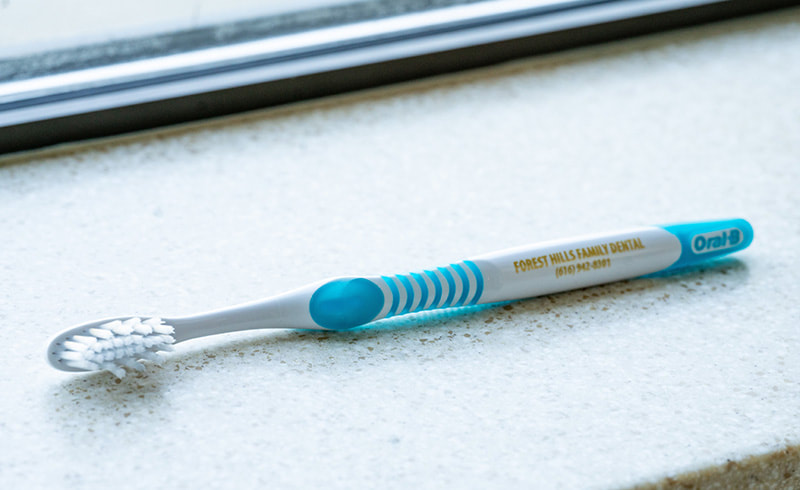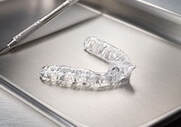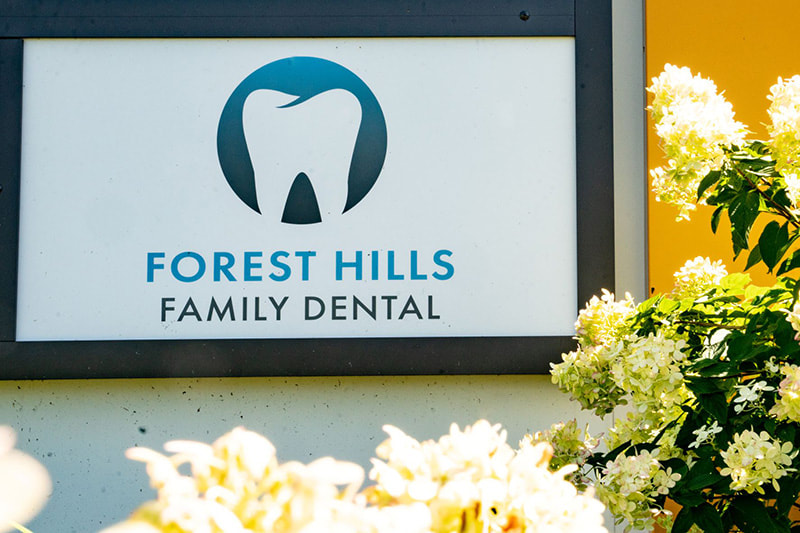Preventative Care
Your oral health and overall health are very important to us. Oral health is related to your overall health in many ways. Preventive dental procedures can help avoid more expensive and painful procedures in the future. Taking preventive measures will ensure a healthy mouth and healthy body.
Prophylactic Cleanings
A healthy mouth is free of inflammation and bleeding, where there is no infection present. A prophy (regular cleaning) will be done if you do not have any infection and minimal inflammation is present (you may require a more involved treatment depending upon your periodontal diagnosis). Seeing the dentist regularly can help prevent infection and maintain a healthy mouth.
A healthy mouth is free of inflammation and bleeding, where there is no infection present. A prophy (regular cleaning) will be done if you do not have any infection and minimal inflammation is present (you may require a more involved treatment depending upon your periodontal diagnosis). Seeing the dentist regularly can help prevent infection and maintain a healthy mouth.
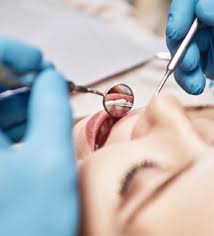
Gum Disease Treatments
Did you know that 47.2% of Americans age 30 and older have gum disease (also called periodontal disease), according to the Centers for Disease Control and Prevention?
Gum disease is caused by untreated dental plaque & tartar buildup on your gums and teeth. Dental plaque that has hardened into tartar can only be removed by one of our hygienists at Forest Hills Family Dental. There are two different types of gum disease—gingivitis and the more serious periodontal disease.
While gingivitis can be reversed by adopting a healthy oral hygiene routine and having teeth professionally cleaned every six months, there is no cure for periodontal disease. Periodontal disease can lead to receding gums, tooth loss, and even jawbone deterioration. There are numerous studies that also prove the oral bacteria and the inflammation associated with gum disease (periodontal disease) have a correlation with certain diseases like diabetes, heart disease, and Alzheimer’s.
Gingivitis & Periodontal Disease are diagnosed by a thorough periodontal examination. Our clinicians diagnose disease by using periodontal measurements, evaluating bone level on xrays, and observing both bleeding & inflammation.
How We Treat Gingivitis
Gum disease can be reversed in its early stages, which is why it’s important to schedule a professional teeth cleaning with your hygienist every six months. If left untreated, gingivitis can turn into periodontal disease (bone loss). During a teeth cleaning, your hygienist will remove plaque and tartar from your teeth so you can maintain good oral health. To reverse gingivitis, your hygienist will also recommend that you improve your oral hygiene routine by brushing twice a day & flossing once daily.
How We Treat Periodontal Disease
Our hygienists can slow the damaging effects of periodontal disease through scaling and root planing. Patients with periodontal (gum) disease tend to have deep gum pockets around teeth that collect plaque and food particles. During the scaling and root planing procedure, your hygienist will use scalers and an ultrasonic instrument to remove tartar, plaque and flush out bacteria from your periodontal pockets. You may need more than one appointment for the treatment of periodontitis. Your dental hygienist will also use a local anesthetic to make the procedure more comfortable. Once you have completed the scaling and root planing procedure you will need to be seen more frequently for periodontal maintenance appointments.
Maintenance Of Periodontal Disease
Even though the infection was eradicated with periodontal disease treatment, your mouth will need ongoing therapy to ensure the infection does not return. You will require more frequent teeth cleanings referred to as periodontal maintenance cleanings. Based on clinical research and microbiological evidence of the periodontal disease process, our dentists & hygienists advise patients to come every three months for their periodontal maintenance cleanings. The plaque maturation cycle plays a role in why patients need to get professional teeth cleaning every three months. Meaning that three months is the estimated time for the pathogenic bacteria to reproduce, multiply, and adversely affect the teeth and gums. If you have a chronic condition such as diabetes, for example, more frequent cleanings can lower your risk for gum disease. Never let your insurance dictate what treatment you need. Always follow science.
Did you know that 47.2% of Americans age 30 and older have gum disease (also called periodontal disease), according to the Centers for Disease Control and Prevention?
Gum disease is caused by untreated dental plaque & tartar buildup on your gums and teeth. Dental plaque that has hardened into tartar can only be removed by one of our hygienists at Forest Hills Family Dental. There are two different types of gum disease—gingivitis and the more serious periodontal disease.
While gingivitis can be reversed by adopting a healthy oral hygiene routine and having teeth professionally cleaned every six months, there is no cure for periodontal disease. Periodontal disease can lead to receding gums, tooth loss, and even jawbone deterioration. There are numerous studies that also prove the oral bacteria and the inflammation associated with gum disease (periodontal disease) have a correlation with certain diseases like diabetes, heart disease, and Alzheimer’s.
Gingivitis & Periodontal Disease are diagnosed by a thorough periodontal examination. Our clinicians diagnose disease by using periodontal measurements, evaluating bone level on xrays, and observing both bleeding & inflammation.
How We Treat Gingivitis
Gum disease can be reversed in its early stages, which is why it’s important to schedule a professional teeth cleaning with your hygienist every six months. If left untreated, gingivitis can turn into periodontal disease (bone loss). During a teeth cleaning, your hygienist will remove plaque and tartar from your teeth so you can maintain good oral health. To reverse gingivitis, your hygienist will also recommend that you improve your oral hygiene routine by brushing twice a day & flossing once daily.
How We Treat Periodontal Disease
Our hygienists can slow the damaging effects of periodontal disease through scaling and root planing. Patients with periodontal (gum) disease tend to have deep gum pockets around teeth that collect plaque and food particles. During the scaling and root planing procedure, your hygienist will use scalers and an ultrasonic instrument to remove tartar, plaque and flush out bacteria from your periodontal pockets. You may need more than one appointment for the treatment of periodontitis. Your dental hygienist will also use a local anesthetic to make the procedure more comfortable. Once you have completed the scaling and root planing procedure you will need to be seen more frequently for periodontal maintenance appointments.
Maintenance Of Periodontal Disease
Even though the infection was eradicated with periodontal disease treatment, your mouth will need ongoing therapy to ensure the infection does not return. You will require more frequent teeth cleanings referred to as periodontal maintenance cleanings. Based on clinical research and microbiological evidence of the periodontal disease process, our dentists & hygienists advise patients to come every three months for their periodontal maintenance cleanings. The plaque maturation cycle plays a role in why patients need to get professional teeth cleaning every three months. Meaning that three months is the estimated time for the pathogenic bacteria to reproduce, multiply, and adversely affect the teeth and gums. If you have a chronic condition such as diabetes, for example, more frequent cleanings can lower your risk for gum disease. Never let your insurance dictate what treatment you need. Always follow science.
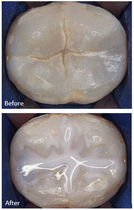
Sealants
A sealant is a thin layer of white material placed on the chewing surfaces of permanent molars to prevent bacteria from causing tooth decay. The sealant quickly bonds into the grooves of the teeth, forming a protective shield over the enamel of each tooth. Since dental sealants provide such strong prevention against tooth decay, they're typically used with children and teenagers once their molars come in.
A sealant is a thin layer of white material placed on the chewing surfaces of permanent molars to prevent bacteria from causing tooth decay. The sealant quickly bonds into the grooves of the teeth, forming a protective shield over the enamel of each tooth. Since dental sealants provide such strong prevention against tooth decay, they're typically used with children and teenagers once their molars come in.
Oral Cancer Screenings
Experts recommend that all adults get screened for oral cancer at least once a year. Many people think that only individuals who smoke or chew tobacco need to be worried about this disease, and it is true that such people are at a greater risk. Those who drink heavily, older individuals, and those who have spent a lot of time in the sun may also be more likely to develop oral cancer. However, no one is exempt from the need for regular screenings. Anyone can develop oral cancer, regardless of their lifestyle or other risk factors.
In recent years, more and more younger people have been developing oral cancer. The trend is partly due to the prevalence of the human papilloma virus (HPV). It is the most common sexually transmitted disease, and most people aren’t even aware that they have it. Certain types of HPV have been linked with the onset of oral cancer.
Experts recommend that all adults get screened for oral cancer at least once a year. Many people think that only individuals who smoke or chew tobacco need to be worried about this disease, and it is true that such people are at a greater risk. Those who drink heavily, older individuals, and those who have spent a lot of time in the sun may also be more likely to develop oral cancer. However, no one is exempt from the need for regular screenings. Anyone can develop oral cancer, regardless of their lifestyle or other risk factors.
In recent years, more and more younger people have been developing oral cancer. The trend is partly due to the prevalence of the human papilloma virus (HPV). It is the most common sexually transmitted disease, and most people aren’t even aware that they have it. Certain types of HPV have been linked with the onset of oral cancer.
THE SCREENING PROCESS
An oral cancer screening is a simple, quick, and painless procedure. Your dentist or one of our hygienists will perform a visual and tactile examination of your mouth and the areas around it. Some warnings signs that we look for include:
An oral cancer screening is a simple, quick, and painless procedure. Your dentist or one of our hygienists will perform a visual and tactile examination of your mouth and the areas around it. Some warnings signs that we look for include:
Is it time for your next oral cancer screening? Contact Us today to schedule a checkup or call/text us at 616.942.8301.
Topical Fluoride Treatments
Fluoride is a naturally-occurring mineral that aides in rebuilding tooth enamel, can prevent further cavities, and helps reverse early signs of tooth decay. Fluoride treatments are available for both children and adults, and are especially good for people with a higher risk for tooth decay, demineralization, or erosion. If you have dry mouth, weak enamel, poor oral health, or if you have crowns, having a fluoride varnish applied would help protect your teeth. Professional fluoride varnish treatments usually only take a few minutes to apply & can help to replace those lost minerals of your tooth enamel. Depending on your oral health, your dentist might recommend professional fluoride treatments every 6–12 months.
If you're at a higher risk of developing tooth decay, your dentist might also recommend other preventive measures to be supplemented at home, such as over-the-counter or prescription fluoride mouth rinses or gels.
Fluoride is a naturally-occurring mineral that aides in rebuilding tooth enamel, can prevent further cavities, and helps reverse early signs of tooth decay. Fluoride treatments are available for both children and adults, and are especially good for people with a higher risk for tooth decay, demineralization, or erosion. If you have dry mouth, weak enamel, poor oral health, or if you have crowns, having a fluoride varnish applied would help protect your teeth. Professional fluoride varnish treatments usually only take a few minutes to apply & can help to replace those lost minerals of your tooth enamel. Depending on your oral health, your dentist might recommend professional fluoride treatments every 6–12 months.
If you're at a higher risk of developing tooth decay, your dentist might also recommend other preventive measures to be supplemented at home, such as over-the-counter or prescription fluoride mouth rinses or gels.
Bite Splint Therapy or TMJ Disorder
Do you suffer from jaw pain or headaches, or have trouble chewing comfortably? You may be one of the many people who have temporomandibular joint disorder (also known as TMD). TMJ disorder is a condition that affects the muscles in the head and neck that are involved in jaw function and the TMJ joint itself. If the jaw isn’t working smoothly, it’s susceptible to problems such as pain or stiffness in either the joint or the muscles surrounding it. When these structures become painful, it’s difficult to eat, speak, smile, or laugh comfortably. Fortunately, there are ways to minimize or eliminate these symptoms, including stress management techniques, massage, occasional use of anti-inflammatory medications, warm compresses, and custom-made nightguards. However, in severe cases that don’t respond well to other treatments, we may refer you to a TMJ specialist for further evaluation and treatment.
Do you suffer from jaw pain or headaches, or have trouble chewing comfortably? You may be one of the many people who have temporomandibular joint disorder (also known as TMD). TMJ disorder is a condition that affects the muscles in the head and neck that are involved in jaw function and the TMJ joint itself. If the jaw isn’t working smoothly, it’s susceptible to problems such as pain or stiffness in either the joint or the muscles surrounding it. When these structures become painful, it’s difficult to eat, speak, smile, or laugh comfortably. Fortunately, there are ways to minimize or eliminate these symptoms, including stress management techniques, massage, occasional use of anti-inflammatory medications, warm compresses, and custom-made nightguards. However, in severe cases that don’t respond well to other treatments, we may refer you to a TMJ specialist for further evaluation and treatment.
Designed to reposition your jaws while you sleep, these appliances can reduce the tension in the joints and help them function properly. A nightguard also absorbs much of the force on your teeth to prevent wear, fractures and other damage.
For many of our patients, wearing a nightguard for several months improves the symptoms associated with TMD and helps them live pain-free. We’re so glad to provide effective, non-surgical TMJ therapy that helps our patients get their quality of life back!
If you think you may have this common disorder, please contact us today or call/text us at 616.942.8301 to schedule a consultation.
For many of our patients, wearing a nightguard for several months improves the symptoms associated with TMD and helps them live pain-free. We’re so glad to provide effective, non-surgical TMJ therapy that helps our patients get their quality of life back!
If you think you may have this common disorder, please contact us today or call/text us at 616.942.8301 to schedule a consultation.

